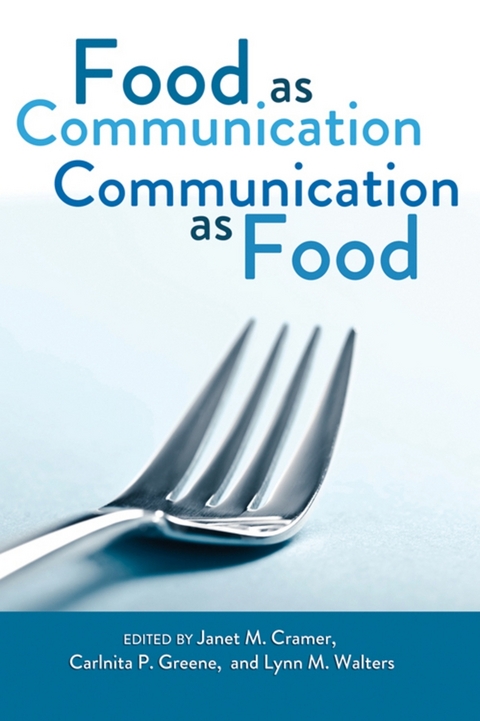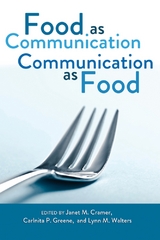Food as Communication- Communication as Food
Peter Lang Publishing Inc (Verlag)
978-1-4331-0963-8 (ISBN)
- Titel z.Zt. nicht lieferbar
- Versandkostenfrei innerhalb Deutschlands
- Auch auf Rechnung
- Verfügbarkeit in der Filiale vor Ort prüfen
- Artikel merken
From high-tech kitchen gadgets and magazines to the Food Network, the last few decades have seen a huge rise in food-focused consumption, media, and culture. The discourses surrounding food range from media coverage of school lunchrooms and hunger issues, to news stories about urban gardening or buying organic products at the local farmers market. Food is no longer viewed merely as a means of survival.
International and comprehensive in approach, this volume is the first book-length study of food from a communication perspective. Scholars examine and explore this emerging field to provide definitive and foundational examples of how food operates as a system of communication, and how communication theory and practices can be understood by considering food in this way. In doing so, the book serves to inspire future dialogues on the subject due to its vast array of ideas about food and its relationship to our communication practices.
Janet M. Cramer, PhD, is an Associate Professor in the Communication and Journalism Department at the University of New Mexico, where she teaches a variety of courses in media studies, journalism, and communication at the undergraduate and graduate level. Her research focuses on the cultural studies of media, including food, gender studies, and media history. She has written a history of media focusing on the cultural and intellectual traditions that have guided media development in the United States, titled Media/History/Society: A Cultural History of U.S. Media (2009). Carlnita P. Greene, PhD, is an assistant professor and Director of the Communication & Rhetoric program at Nazareth College of Rochester. Her research can be broadly defined as the intersection of rhetorical theory and popular culture. She has previously published on subjects as diverse as food culture and the media, identity and social style, rhetorical theory in the twenty-first century, and popular culture and pedagogy. Lynn M. Walters, M.S., is founder and Executive Director of Cooking with Kids, Inc., an award-winning non-profit organization that engages elementary school children in hands-on experience with fresh, affordable foods from diverse cultures. Her research interests focus on the behavioral effects of experiential learning with food; family, peer, and environmental influences on cooking and food choice; and the connections between pleasure and health.
Contents: Carlnita P. Greene/Janet M. Cramer: Beyond mere sustenance: Food as communication/Communication as food – Laura A. Lindenfeld: Feasts for our eyes: Viewing films on food through new lenses – Deborah Morrison Thomson: Play with your food: The performativity of online breakfast cereal marketing – Defne Karaosmanoglu: Remembering past(s): The construction of cosmopolitan Istanbul through nostalgic flavors – Adele Wessell/Andrew Jones: Faith-based homespace: Decoding good taste in a monastery – Carlnita P. Greene: Competing identities at the table: Slow food, consumption, and the performance of social style – Kristen Lucas/Patrice M. Buzzanell: It’s the cheese: Collective memory of hard times during deindustrialization – Kevin-Khristián Cosgriff-Hernández/Amanda R. Martinez/Barbara F. Sharf/Joseph R. Sharkey: «We still had to have tortillas»: Negotiating health, culture, and change in the Mexican American diet – Kathleen M. German: Memory, identity, and resistance: Recipes from the women of Theresienstadt – Fabio Parasecoli: Looking at men’s tables: Food and masculinities in blockbuster movies – John R. Thompson: Dinner time discourse: Convenience foods and industrial society – Vincent (Tzu-Wen) Cheng: «A four-legged duck?»: Chinese restaurant culture in the United States from a crosscultural/inter-cultural communication perspective – Christie McCullen: The white farm imaginary: How one farmers market refetishizes the production of food and limits food politics – Jessica Mudry: Quantifying the American Eater: USDA nutrition guidance and a language of numbers – Barry Brummett: Hunting, gardening, and the original work of art: A homological analysis – Michael S. Bruner/Jason D. Meek: A critical crisis rhetoric of seafood – Anne Marie Todd: Eating the view: Environmental aesthetics, national identity, and food activism – Janet M. Cramer: Discourses of consumption and sustainability on the Food Network – Matthew Kaplan/Lynn James/Frances Alloway/Nancy Ellen Kiernan: Youth empowerment in family conversations and decision-making about food – Marianne LeGreco: «Mama thinks I’m feeding you»: Using food rules to restructure school meal programs – Tara J. Schuwerk: Food bank culture: Food and nutrition communication in a hunger-relief organization – Ross Singer: The corporate colonization of communication about global hunger: Development, biotechnology, and discursive closure in the Monsanto pledge – Lynn M. Walters: High school students’ perceptions of environmental and communicative influences on eating behavior.
| Erscheint lt. Verlag | 16.3.2011 |
|---|---|
| Verlagsort | New York |
| Sprache | englisch |
| Maße | 160 x 230 mm |
| Gewicht | 780 g |
| Themenwelt | Sachbuch/Ratgeber ► Beruf / Finanzen / Recht / Wirtschaft ► Briefe / Präsentation / Rhetorik |
| Geisteswissenschaften ► Sprach- / Literaturwissenschaft ► Literaturwissenschaft | |
| Sozialwissenschaften ► Kommunikation / Medien ► Journalistik | |
| Sozialwissenschaften ► Kommunikation / Medien ► Kommunikationswissenschaft | |
| Sozialwissenschaften ► Soziologie ► Spezielle Soziologien | |
| Schlagworte | Food, Communication, Cultural Studies, Rhetoric, Intercultural communication, Environmental Communication, Communication Theory |
| ISBN-10 | 1-4331-0963-8 / 1433109638 |
| ISBN-13 | 978-1-4331-0963-8 / 9781433109638 |
| Zustand | Neuware |
| Haben Sie eine Frage zum Produkt? |
aus dem Bereich




